On the afternoon of June 22, the 2025 graduation ceremony for the Tsinghua University School of Economics and Management (Tsinghua SEM) was held at the Tsinghua University Gymnasium. Graduating students from the 2025 cohort attended along with their families and friends. Dean Bai Chong-En presided over the graduation ceremony, and Zhang Bo, professor of Computer Science and Technology Department of Tsinghua University, fellow of Chinese Academy of Sciences, and the honorary director of Institute for Artificial Intelligence of Tsinghua University, delivered the commencement speech.
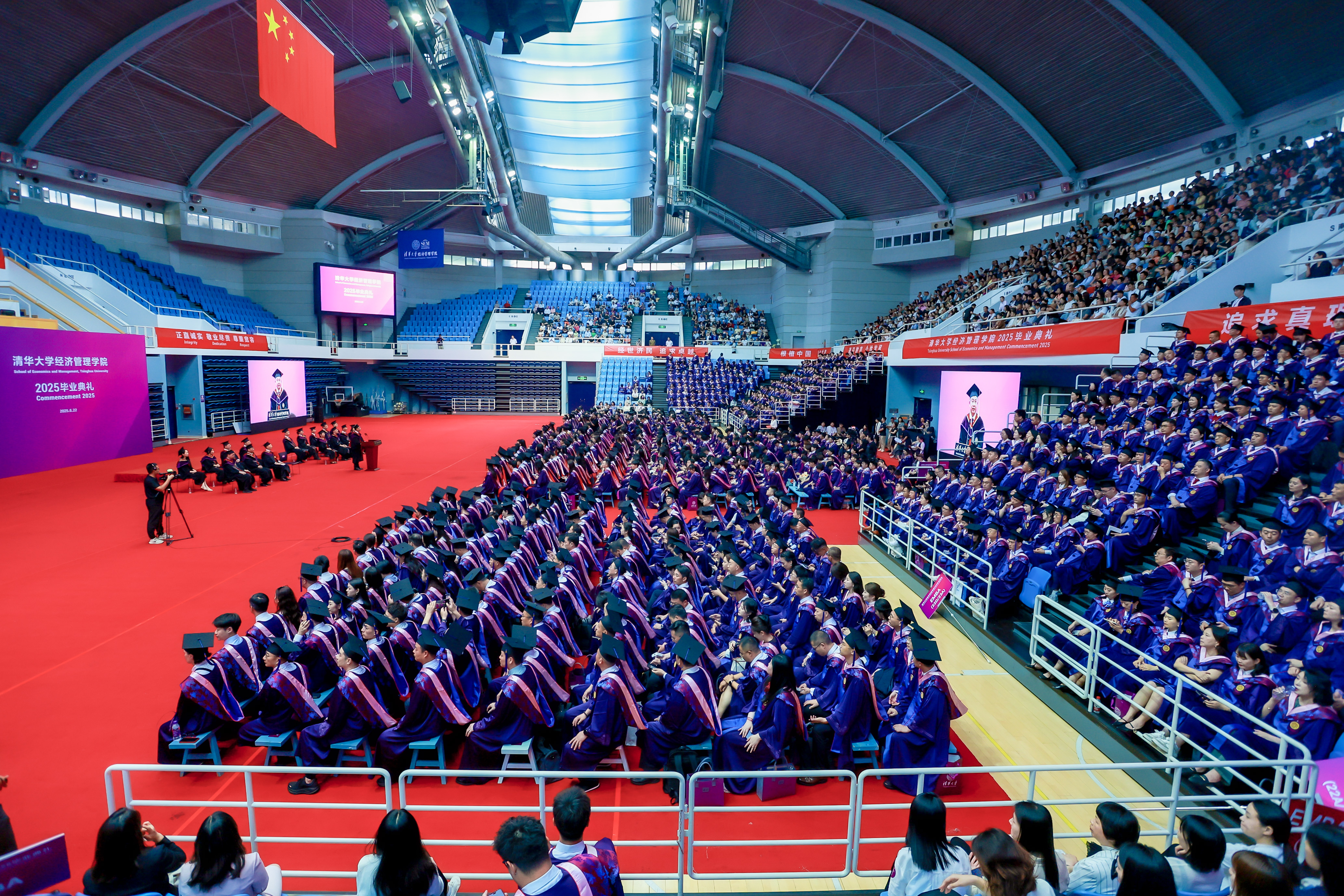
The 2025 graduation ceremony of Tsinghua SEM
Before the ceremony commenced, the organizers played videos of the school's academic programs, offering a nostalgic reflection of the students' wonderful times on Tsinghua's campus. Professors and mentors also shared words of advice and well wishes as the new graduates prepared to embark on their new journey in life.
As the ceremony commenced, everyone stood and sang the national anthem of the People's Republic of China. The dean welcomed the graduating students, their families, and friends attending the graduation ceremony, and then spoke on the students' graduation status. During the 2024-2025 academic year, a total of 1,899 students graduated from Tsinghua SEM.
The ceremony continued with the awarding of the prestigious Chen Daisun Memorial Scholarship. This esteemed recognition is considered the highest honor bestowed upon undergraduate students at Tsinghua SEM. Its purpose is to recognize graduates who possess exceptional qualities, including a combination of exemplary moral character and academic excellence, significant personal development, outstanding overall attributed, and who reflect Tsinghua University's undergraduate education philosophy. Dean Bai Chong-En announced this year's list of recipients, which includes Zhang Shiying from the SEM Class of '12-18, and Liu Xinwei from the SEM Class of '14.
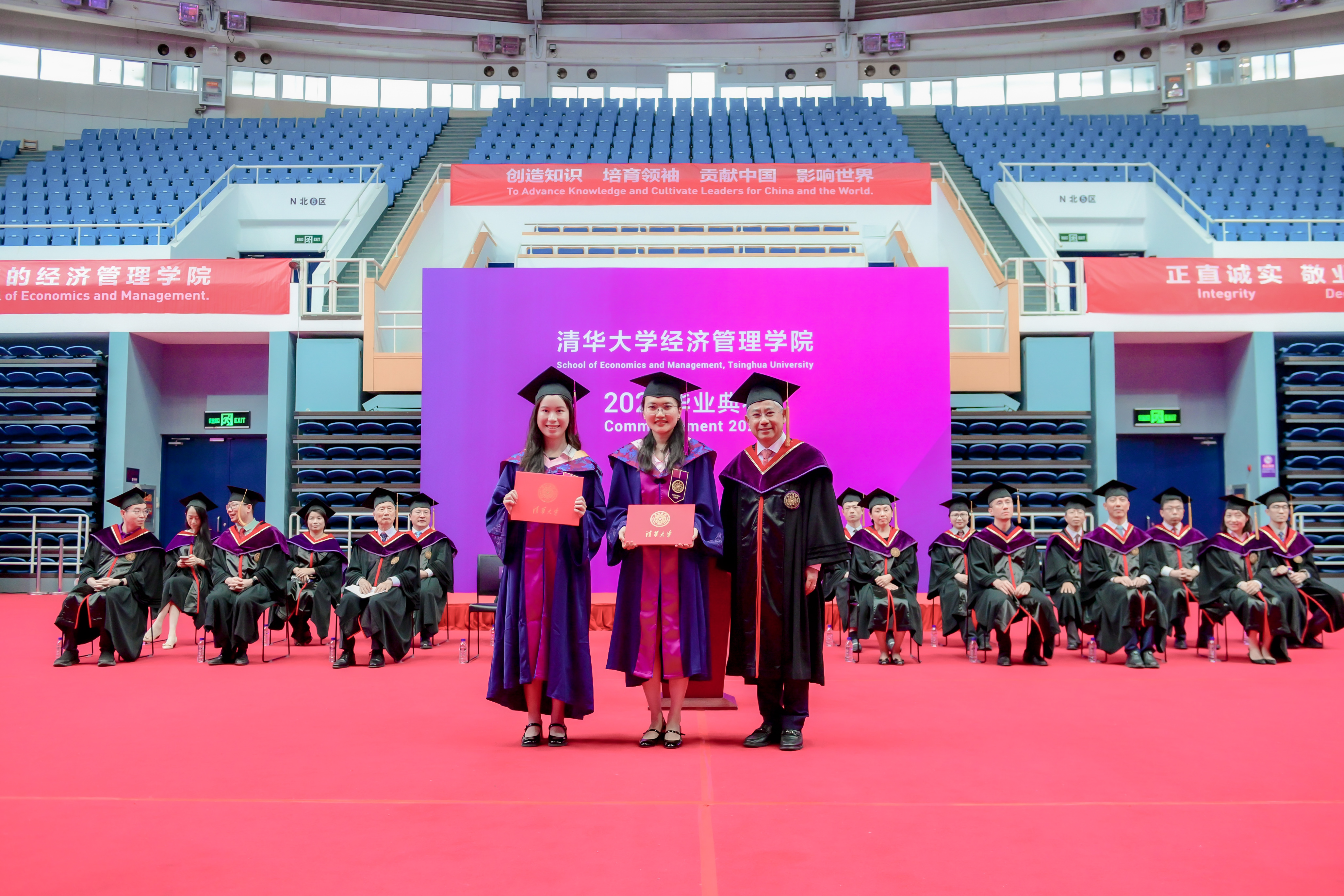
Bai Chong-En presents the Chen Daisun Memorial Scholarship to undergraduate students (left to right: Zhang Shiying, Liu Xinwei, and Bai Chong-En).
After the award ceremony, nine new graduates took to the stage to speak: Zhang Shiying and Tang Fangli, graduates of undergraduate programs; Tang Cheng, a graduate of the minor program; Liu Fan, a master's program graduate; Yu Shuangchen, a doctoral program graduate; Wu Guowei, an MBA program graduate; Jennifer Maria Peterlin, a GMBA program graduate; Howard Ken Lukmito, a dual-degree graduate from the Tsinghua-INSEAD EMBA program; and Zhou Lichen, an EMBA program graduate. They shared their achievements and insights gained during their time at Tsinghua SEM, expressed gratitude for the guidance offered by mentors and genuine friendships they formed with their classmates, and asked their fellow graduates to continue upholding the spirit of Tsinghua, fulfilling the mission of Tsinghua SEM, holding on to their original passion, striving forward, and embracing a limitless future.
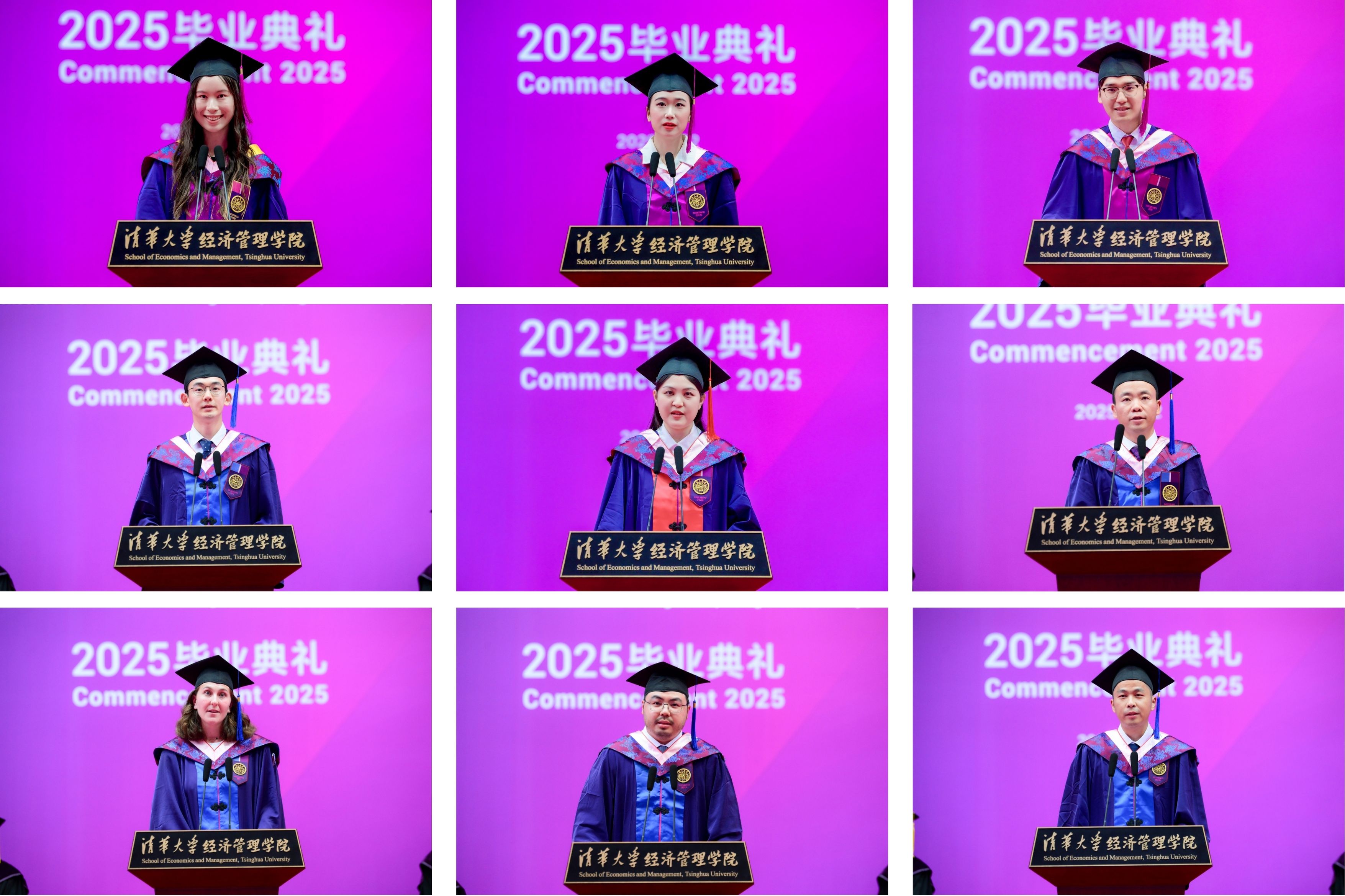
Graduating students deliver speeches (left to right, top to bottom: Zhang Shiying, Tang Fangli, Tang Cheng, Liu Fan, Yu Shuangchen, Wu Guowei, Jennifer Maria Peter, Howard Ken Lukmito, and Zhou Lichen).
Bai Chong-En introduced commencement speaker Zhang Bo, who received the Honorary Doctor of Natural Sciences by Hamburg University in 2011 and the lifetime achievement award by China Computer Federation (CCF) in 2014. Zhang also received the Wu Wenjun artificial intelligence highest achievement award in 2019, and was named the 2024 China Newsweek Educator of the Year. Zhang's research interest lies in the fundamental theory of artificial intelligence, artificial neural networks, machine learning, and their applications to pattern recognition, knowledge engineering, and robotics. In these fields, he has published over 200 papers and five monographs (chapters). His academic achievement won the ICL European Artificial Intelligence Prize and other honors. In addition, Zhang took part in building up the State Key Lab of Intelligent Technology and Systems and served as the director of the lab from 1990 to 1996.
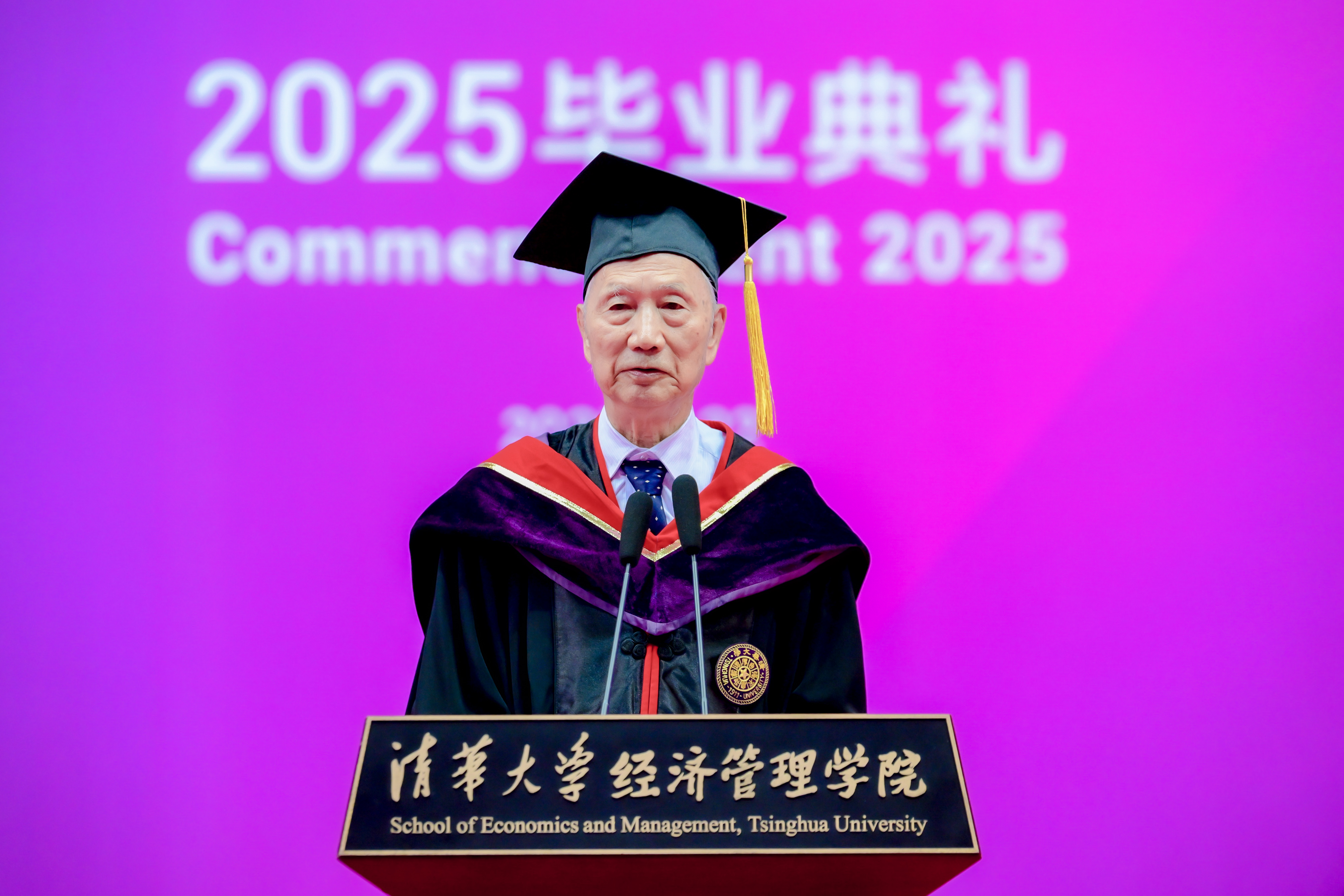
Zhang Bo delivers his speech.
Zhang delivered an inspiring commencement speech to the 2025 graduates. Drawing on his own experience studying at Tsinghua University and engaging in artificial intelligence research, Zhang spoke in detail about the transformation and opportunities facing the discipline of economics and management in an era when generative AI is profoundly reshaping all sectors of society.
Zhang pointed out that artificial intelligence is exerting a far-reaching influence on markets, business models, organizational structures, and corporate strategies, leading to systematic and transformative changes in the research paradigms, methodological tools, decision-making mechanisms, and organizational models within the field of economics and management. These shifts inevitably call for a transition in talent cultivation – from traditional management expertise to the development of interdisciplinary and AI-savvy professionals. Educational objectives are shifting from merely "understanding management" to "leveraging AI to manage," with greater emphasis on intelligent interaction, experiential learning, and integration of AI-related content into curriculum. This is fostering a trend toward interdisciplinary convergence. As a result, the economics and management profession itself is being reshaped by AI, and professionals well-versed in the integration of AI with economics and management will be better positioned to meet the demands of a globally competitive market.
Zhang emphasized that economics and management occupy a fundamental, strategic, interdisciplinary, and practice-oriented position in today's society. It is a foundational discipline for social and national governance, a central pillar of corporate strategy and management practice, a bridge between economic theory and technological application, and a general education platform that supports talent development and social progress. Its role in national strategy and global competition also is becoming increasingly prominent. Now that artificial intelligence has become a new driving force across academic disciplines, Zhang encouraged everyone to remain true to their original aspirations, seize this historic opportunity, and carry forward the Tsinghua spirit of self-discipline, forging their own path to a meaningful and distinguished life.
After Zhang's speech, Bai Chong-En made a concluding statement. The dean said he hopes that the students will draw inspiration for the future from Zhang's speech and keep Zhang's expectations firmly in mind. In a world full of opportunities and uncertainties, Bai encouraged everyone to maintain a spirit of ambition and initiative, keep learning, strengthen interdisciplinary capabilities, and broaden their horizons. By making thoughtful, strategic choices and staying committed to their chosen path, students can contribute to the progress of human civilization and the rejuvenation of the Chinese nation. Along the way, may the graduates also find joy on the journey and live a meaningful and fulfilling life, Bai said.
After the dean's speech, the faculty and students in the audience stood to sing the Tsinghua University school anthem, marking the end of Tsinghua SEM's 2025 graduation ceremony.
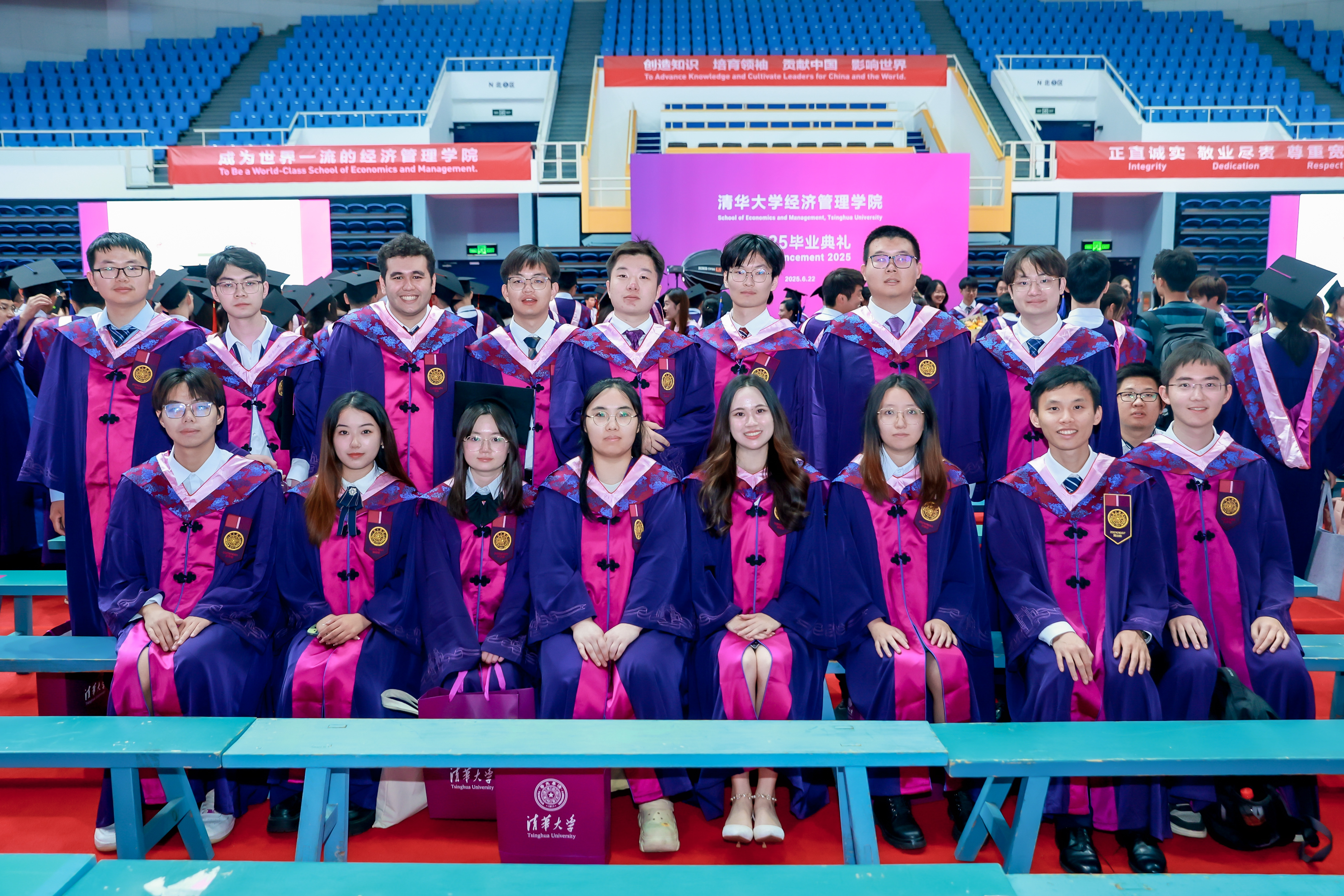
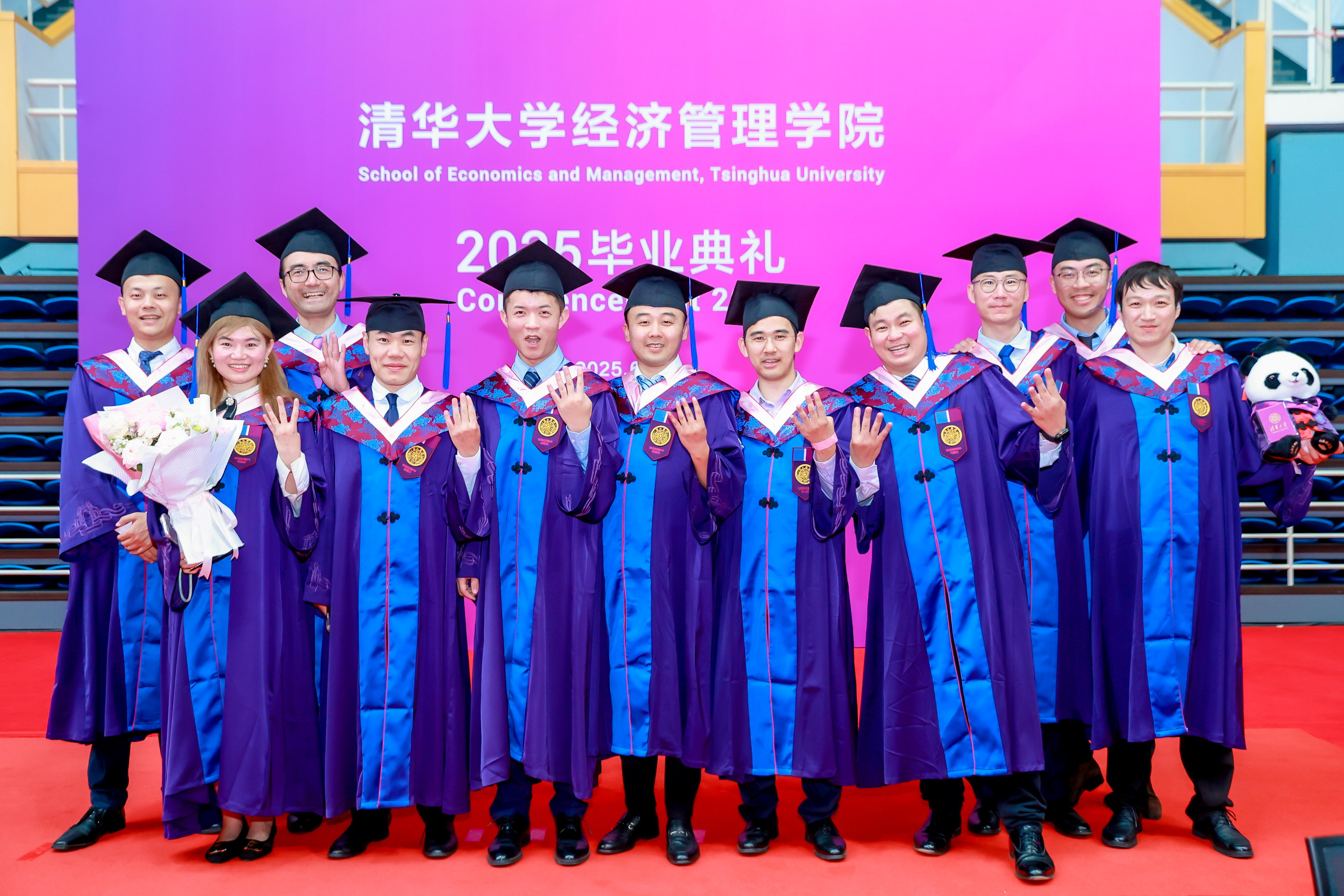
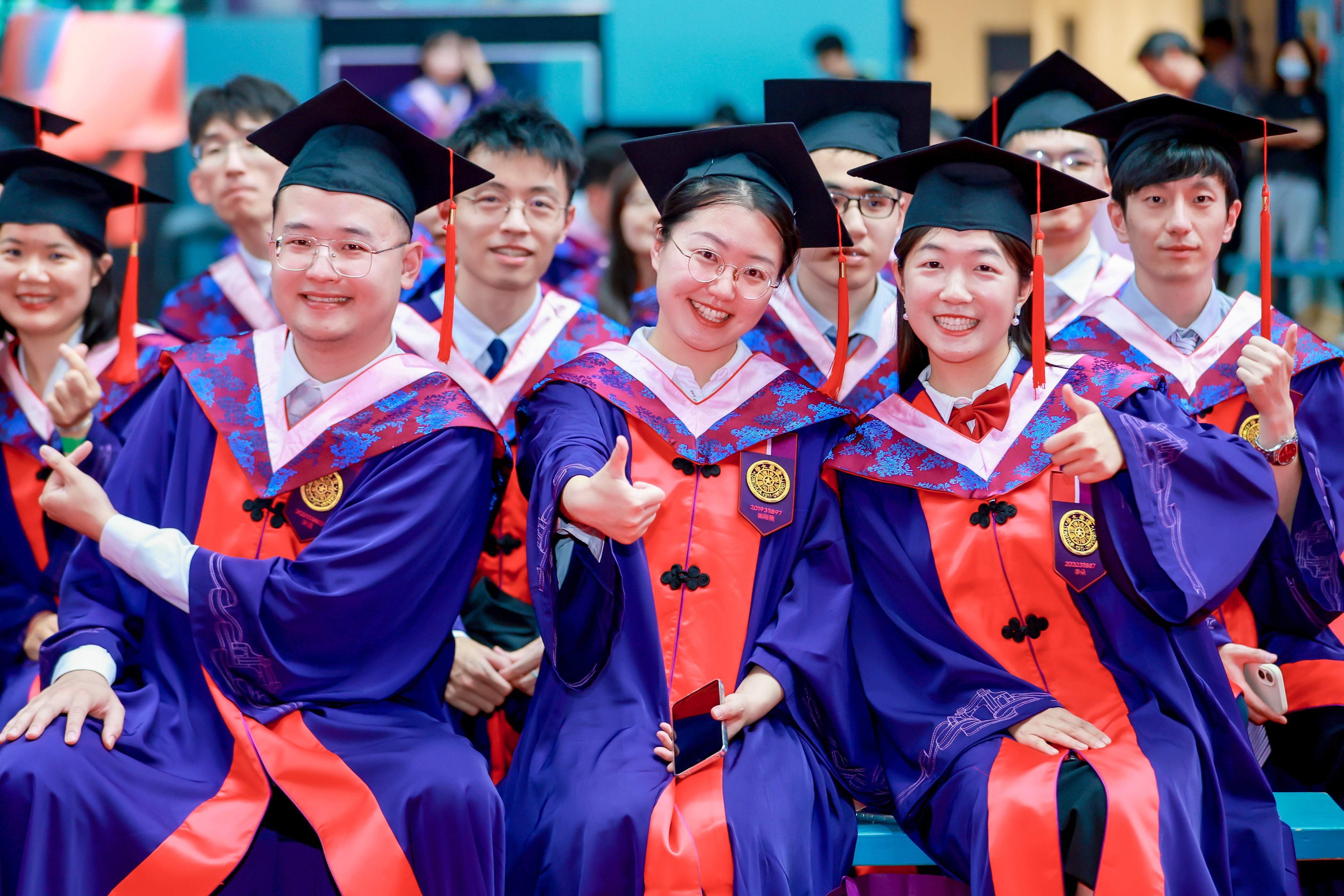
Graduates pose for pictures at the Tsinghua SEM 2025 graduation ceremony.
Bai Chong-En took individual photos with each graduating student from June 20 and 22.
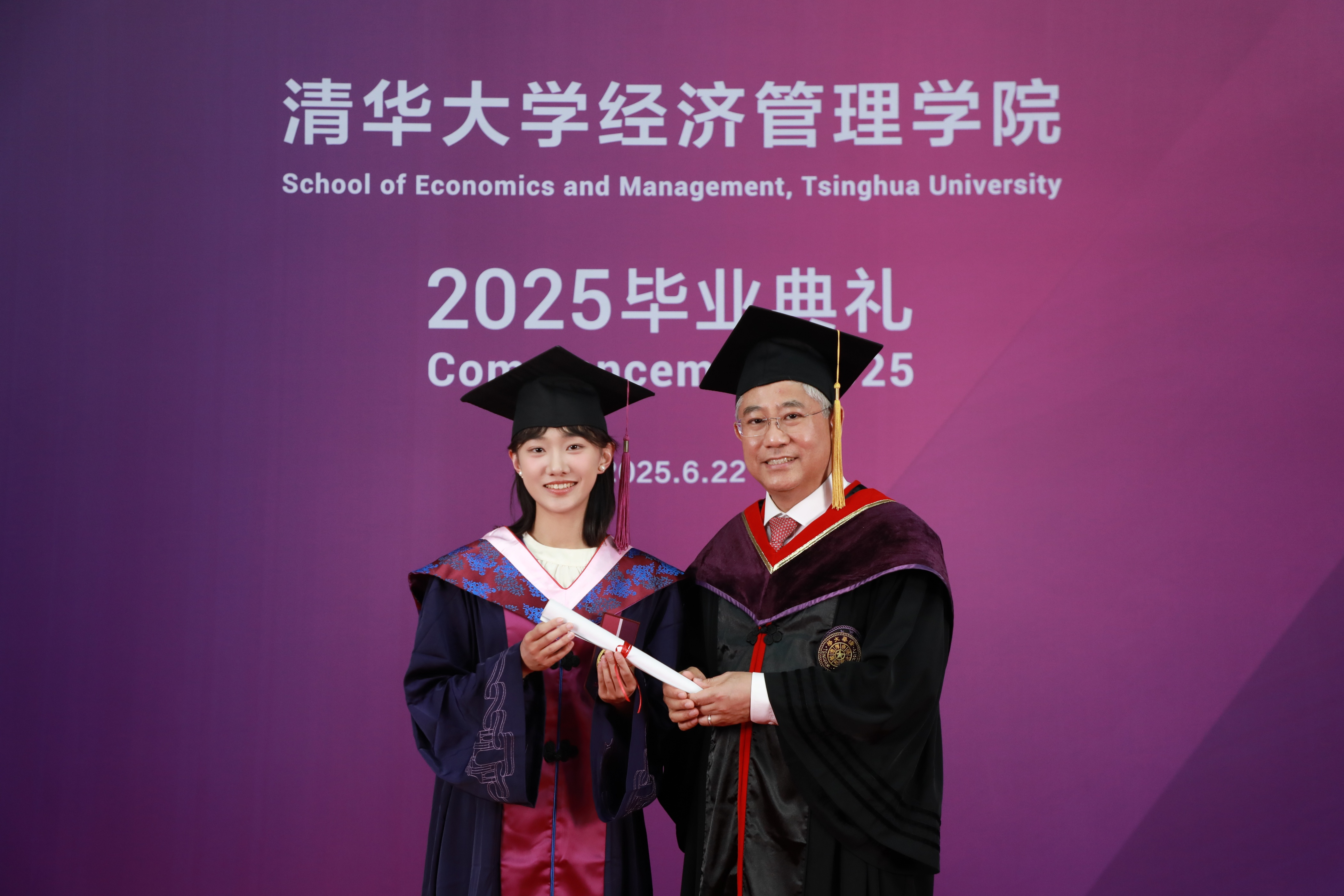
Bai Chong-En takes a photo with a graduating student.
Before the graduation ceremony, Tsinghua SEM organized a reception in the square at the Lihua Building. Approximately 1,000 graduating students and their families and friends were present. The faculty and students performed singing, dancing, and music to convey their well-wishes for the graduates. The students expressed their heartfelt farewells and shared the memorable and joyful moment with their teachers and families.
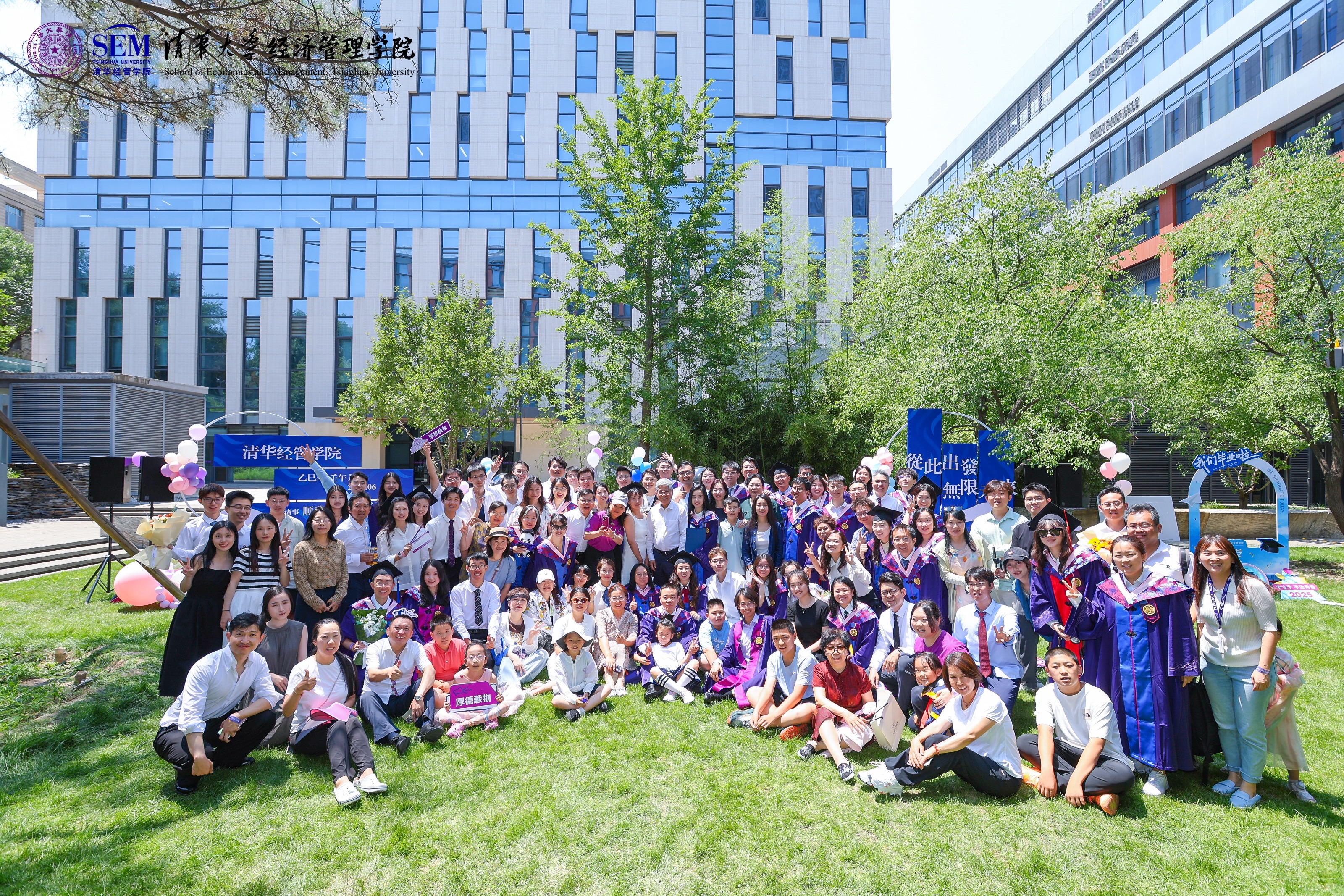
Participants of the Tsinghua SEM 2025 graduation reception.
Editor: Ren Zhongxi
 Latest News
Latest News